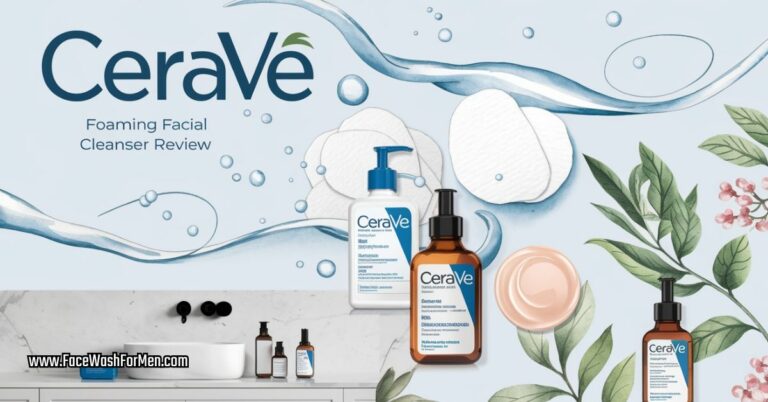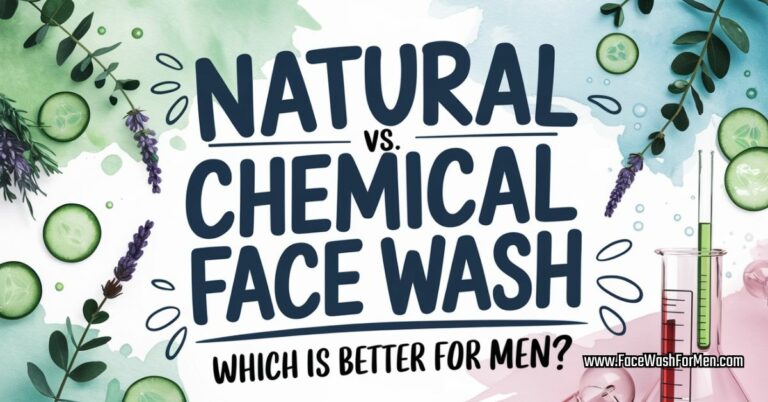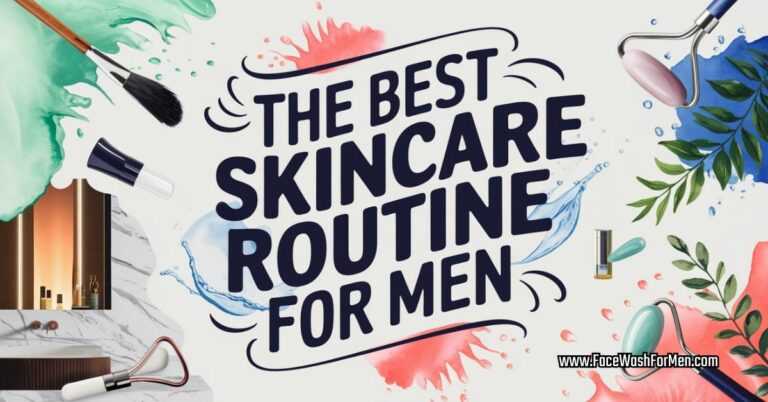Did you know that many common men’s facial cleansers contain ingredients that can do more harm than good? That’s right! The very products we rely on to keep our skin clean and refreshed may actually be sabotaging our skin health.
In this article, I will explore the most prevalent ingredients found in men’s facial cleansers and highlight those that should be avoided for healthier skin. The world of skincare can be overwhelming, with countless products claiming to be the best. By understanding what to look out for, we can make informed choices and ultimately elevate our grooming game.




Harsh Sulfates: The Skin’s Worst Enemy
When I first started using facial cleansers, I was drawn to the foamy lather and fresh scent.
Little did I know that the key ingredient responsible for that bubbly goodness—sulfates—was a major culprit in stripping my skin of its natural oils.
Sulfates, like Sodium Lauryl Sulfate (SLS) and Sodium Laureth Sulfate (SLES), are common in many facial cleansers due to their powerful cleansing properties.
Why Sulfates Are Problematic
Sulfates are effective in removing dirt and oil, but they do so at a significant cost.
When I switched to a sulfate-free cleanser, I noticed a remarkable shift in my skin’s health. The benefits of avoiding sulfates became clear:
Real-World Impact
To illustrate, I used to rely on a cleanser loaded with sulfates that left my skin irritated and sensitive.
After making the switch to a gentler, sulfate-free option, my irritation subsided, and I learned how to truly care for my face without harsh chemicals.
For those looking for a sulfate-free option, I recommend trying the Every Man Jack Daily Skin Care Set.
It offers a refreshing alternative that won’t compromise your skin’s integrity while effectively cleansing.
By avoiding sulfates, you open the door to healthier and happier skin. Get ready, as we will soon dive into another common ingredient to steer clear of: synthetic fragrances.
Synthetic Fragrances: A Hidden Danger
As I became more conscious of what I put on my skin, one area that puzzled me was the presence of synthetic fragrances.
These invisible additives often make products smell delightful, but they can also pose significant risks, especially for delicate skin.
The Problems with Synthetic Fragrances
It’s alarming to discover that synthetic fragrances can trigger allergic reactions and sensitivities in many individuals.
When I first noticed my skin reacting poorly to certain cleansers, I began connecting the dots back to the fragrances. Here’s what I learned:
To mitigate these issues, I opted for fragrance-free options. Products usually labeled as “unscented” can often still contain irritating compounds, so I look for those that explicitly state they are fragrance-free.
Transitioning to fragrance-free cleansers has drastically improved my experience with skincare.
My routine is now about soothing, not irritating. It’s a game-changer, and it makes me eager to explore more about how other potentially harmful ingredients, such as alcohols, can also impact our skin health.
Alcohol: The Dehydrator
As I delved deeper into my skincare journey, I discovered that alcohol is yet another sneaky ingredient often lurking in men’s facial cleansers.
While it may be included to improve texture and help other ingredients absorb better, the downside is that alcohol can be incredibly drying and irritating to the skin.
The Downside of Alcohol
When I first started using products containing alcohol, I appreciated the immediate freshness they provided.
However, after regular use, I began to notice my skin feeling tight and uncomfortable. Here are some key concerns about alcohol in cleansers:
My Personal Experience
After realizing the negative impact of alcohol on my skin, I made a conscious effort to switch to alcohol-free cleansers.
One product that I found particularly beneficial is the CeraVe Hydrating Facial Cleanser for Dry Skin.
This formula gently cleanses without the drying effects of alcohol, leaving my skin feeling soft and balanced.
Previously, I didn’t believe a cleanser could actually help retain moisture rather than strip it away, but this experience proved me wrong.
Choosing alcohol-free products has transformed my skincare routine and improved my skin’s overall health.
As we move forward, let’s explore another controversial ingredient in men’s facial cleansers: parabens.
Parabens: The Controversial Preservatives
When I first encountered parabens in ingredient lists, I had no clue about the debates surrounding them.
These preservatives—used to extend the shelf life of products—are packed into countless cleansers and moisturizers.
However, the more I learned, the more I realized that their potential health risks could not be ignored.
Understanding Parabens’ Risks
Research has highlighted concerns about parabens disrupting hormone function.
They can mimic estrogen in the body, which raises alarms about potential links to hormone-related conditions.
The following points summarize why I’ve decided to steer clear of products containing parabens:
In my search for paraben-free cleansers, I’ve come across some remarkable formulations that focus on quality ingredients without compromising my health.
For example, the PURA D'OR Vitamin C Face Wash is a refreshing choice that avoids harsh preservatives while effectively cleansing.
Eliminating parabens from my skincare regimen felt like a smart move, supporting my commitment to healthier skin.
With that in mind, let’s take a closer look at another ingredient you might want to avoid: microbeads and exfoliating scrubs, which have their own environmental and health concerns.
Microbeads and Exfoliating Scrubs: An Environmental Concern
As I continued my quest for better skincare, I stumbled upon another striking issue: the presence of microbeads in exfoliating cleansers.
While these tiny plastic beads promise smooth skin by providing physical exfoliation, they come at a significant environmental cost that simply cannot be ignored.
The Environmental Impact of Microbeads
Microbeads are often made from polyethylene, and they easily wash down the drain, slipping through water treatment systems and ending up in oceans and waterways.
Here’s what you need to know about the fallout:
In my journey toward a sustainable routine, I decided to ditch products containing microbeads and instead explore eco-friendly options.
One standout find was the DHC Facial Scrub for Gentle Exfoliation, which uses natural ingredients to provide a gentle exfoliation without the negative environmental effects of microbeads.
Mindfulness in Skincare Choices
Making the switch took some reflection, but now I’m committed to being more conscious of what I wash down the drain.
Every time I wash my face, I’m reminded of the ripple effects my choices have on the planet.
As I look to finalize my approach to skincare, it’s crucial to consider how these choices can also lead to healthier skin in the long run.
Let’s wrap up by reviewing how being informed about the ingredients we use can empower us to make better decisions for our skin and the environment.
Making Informed Choices for Healthy Skin
In conclusion, it’s crucial to be aware of the ingredients lurking in men’s facial cleansers.
Harsh sulfates, synthetic fragrances, alcohol, parabens, and microbeads can all detract from our skin’s health and the environment’s well-being.
By avoiding these harmful components, we can protect our skin from irritation and dehydration while supporting more sustainable practices.
I encourage you to take a proactive approach to your skincare routine. Be curious, read labels, and choose products that prioritize gentle, natural ingredients.
In doing so, you not only invest in your skin’s health but also contribute to a cleaner planet. Remember, good skincare is not just about looking good—it’s about feeling good too!





